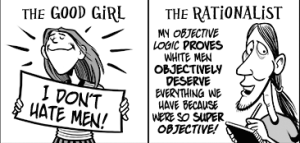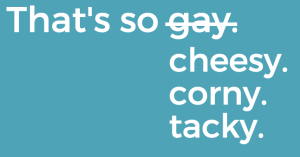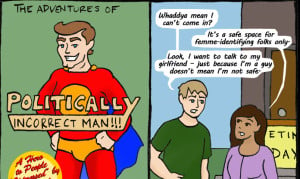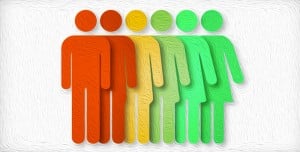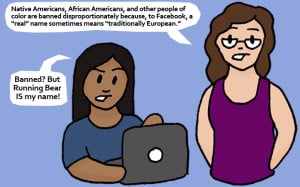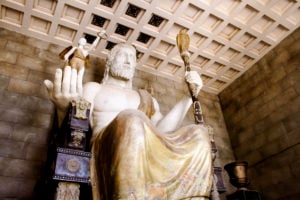
The god Zeus sits on his throne.
Class privilege is the notion that people with more access to wealth have advantages over people with less.
The word privilege – from the Latin privies, meaning “private,” and leg, meaning “law” – literally translates to “private law.” Indeed, in our capitalist society where money dictates a person’s status, laws (both legal and social) apply differently to people depending on where they fall in the constructed hierarchy.
The three tiers of wealthy, middle, and poor and working class, contain significant differences not only in income range, but also in status in society and access to foundational needs like food, shelter, healthcare, and employment.
The policing of Black bodies, Trump’s “grabbing” of body parts, the suicide and murder rates of trans people, and the lack of rights for people with disabilities all exemplify how privilege exists (or doesn’t) for different groups of people. These forms of power and oppression are often, though not always, on feminists’ radars.
But more access to wealth is also blocked by layers of discrimination that correspond with each factor that differs from the most mobile individuals in our society: white, straight, able-bodied, American-born cis men.
Meanwhile, among people who are making enough money to be comfortable (or beyond), there’s this assumption that everyone lives as they do. And if they don’t, it’s because “they don’t want” to or “have not worked hard enough.”
Unfortunately, this is often a lot of feminists.
And that’s a common problem: People who benefit from privilege often neglect to understand that the resources and opportunities that they have affect the ease with which they’re perceived as capable and deserving.
We often don’t acknowledge that it’s a privilege not to have to contend with the experiences of being perceived or treated as “less than.” In fact, we often haven’t even considered it.
So the question becomes: How do we, especially as people advocating for social justice, create a framework for helping people understand the ways in which privilege operates?
Sometimes, we don’t have to make up our own framework to gain a more enlightened view of the world. Myths and folklore, extending as far back as ancient civilizations, having been doing exactly that for centuries – functioning as stories to explain the world around us.
Religious texts – such as the Qu’ran, the Bible, or the Vedas – for example, contain narratives that exist as stand-ins for our experiences. Characters can function both as an interpersonal connection and create a distance that allows us to engage with parts of ourselves that might be difficult or impossible otherwise.
When we are identifying with the limitations of a character, we can avoid the defensiveness of being singularly “bad” or “ignorant” and analyze parallels in our lives to see how we might improve.
Using mythology as a starting point for understanding our own surroundings allows us to take in lessons that we can ruminate on – and might be able to connect to later.
Greek mythology can be a really helpful foundation in starting to think through hierarchies of any kind, including class. The very construction of Mount Olympus demonstrates a tiered system of privilege similar to our own – and the stories that stem from it show how the environment a person becomes accustomed to can serve as a buffer between them and everyone else.
Grade school may have been the last time you thought about Greek mythology, and chances are you haven’t thought about it having the capacity to aid in the understanding of class privilege – but it can be a really useful way for us to learn (and teach others) about how hierarchies such as class function.
So let’s bring back up the image of those half-naked, illuminated beings hovering in the clouds to see what they can reveal to us when looked at a bit more critically.
Specifically, let’s look at five different myths that shed some light on our own class structures.
1. Mount Olympus
Mount Olympus – the highest mountain in Greece – was the residence of the Olympian gods: Zeus, Hera, Poseidon, Hestia, Hades, and Demeter. From this vantage point, these deities were able to look down upon (and fuck with – both literally and figuratively) the mortals below.
The Greek gods came to inhabit their space in the sky just like wealthy Americans came to inhabit their self-appointed status at the tippy top of the socioeconomic strata: without regard to how it would affect anyone but themselves.
In this hierarchal system, Zeus was deemed the most powerful of the gods – and those gods closest to him became powerful in connection to him. Demi-gods had less power than gods, as they were only half god. And humans were the least powerful of all three groups, as they were zero percent god, and the most vulnerable because of it.
While Zeus was a bit arbitrary with the extension of power to others in his family, they were in much better positions to access power as his relations than they would be as demi-gods or humans, who could never inhabit Mount Olympus. For instance, one of his daughters, Athena, was allowed to use the thunderbolt, her father’s weapon, because she was his favorite.
If we look at our upper class, we see similar patterns of nepotism or “access.”
For example, George W. Bush’s presidency was possible because of his father’s, Tori Spelling’s acting career started because her father was the producer of 90210, and Helena Bonham Carter has appeared in many a Tim Burton film since her marriage to him.
People born into wealth have a much higher chance of being wealthy themselves, as they have access to a network of people that have the power and influence to give them access to positions that maintain that wealth.
At the bottom of the power structure in Greek mythology are the humans, who are mercilessly moved around like chess pieces on a board, for the entertainment of the gods or in order to settle their disagreements.
Our poor and working class are most like the humans in the Greek hierarchy, as they have the least social mobility and access to wealth and well-being and the least influence over making changes to the structure that keeps them there.
2. Narcissus
Before we start here, it’s important to note that the myth of Narcissus is different than the namesake personality disorder we know of today as narcissism, a legitimate (though profoundly misunderstood) struggle that people deal with in all social classes.
In the actual myth, Narcissus falls in love with his own image, becoming completely absorbed in himself. He’s so enamored with himself that he’s oblivious to Echo’s love for him – and his isolation ultimately kills him.
To perceive oneself as more important than others, whether consciously or subconsciously, is harmful. As we saw in the hierarchy of the Greek gods above, their perception of their own importance over everyone else enables a callousness that allows them to use humans as playthings.
Similarly, Narcissus’ complete and all-consuming admiration of self is an exhibition of entitlement, similar to that which we see in our own wealthy classes.
Narcissus benefits from the privilege of a stasis uninterrupted by self-analysis, made possible by his existence in a closed loop. In this loop, his image is reflected back to him as one of importance and superiority and is maintained indefinitely. His view of himself is at the expense of seeing others as important – but this, too, is invisible to him.
In the myth of Narcissus, the mirror serves as a reflective surface. If we replace the literal mirror with the mirroring that occurs between individuals in a closed wealth existence, we’re looking at a narcissistic reflection of superior worth in both cases.
Here’s a real-life example for you: In an article in Proceedings of the National Academy of Sciences, researchers reported their findings, watching drivers at a four-way intersection. What they found was that those in more expensive cars were much more likely not to yield to a pedestrian in a crosswalk, going around them instead. But people in lower “status” vehicles were more likely to stop and let the pedestrian pass.
The study concludes that class privilege elevates people’s perceived status of themselves over others, leading them to potentially act less patiently and more selfishly (and often, more recklessly) due to a their inflated perception of themselves.
Now that’s what I call narcissistic.
3. Medusa
Medusa is a great example for demonstrating a lack of empathy – which we can also connect to the experience of holding class privilege.
This snake-haired, greenish monster with fury in her eyes is known for being able to turn people to stone with just a look.
And as a monster, she’s unable to relate to the people that she turns to stone, which allows her to do so without remorse.
Empathy is necessary for human connection to exist. To relate to a person’s experiences is a crucial part of supporting them and initiating or maintaining community. But, like Medusa, those who are wealthy have the option of staying disconnected from others, as their well-being isn’t as intertwined with the well-being of others.
Those who have less access to wealth and resources are more communal out of necessity. Those with more money can afford to buy more, relying less on other for assistance.
Indeed, in the article “The Rich Are Different – And Not in a Good Way,” Brian Alexander writes, “Their life experience makes them less empathetic, less altruistic, and generally more selfish” – behavior that he believes is fueled by the lack of necessity for “prosocial” behaviors that poor and working class people must learn to survive.
Just like Medusa, the distance that people with class privilege create from the realities of others can fuel a lack of empathy and lead to selfish or hurtful actions.
Daniel Goleman states in “Rich People Just Care Less” that “in politics, readily dismissing inconvenient people can easily extend to dismissing inconvenient truths about them… [C]utting financing for food stamps and impeding the implementation of Obamacare…may stem in part from the empathy gap.”
Those with more wealth have more access to changing laws and influencing policy than others do. Therefore, those with access to wealth must be empathetic to the needs of others in order to consider the needs of everyone – and not just themselves.
But instead, this lack of empathy turns everyone to stone.
4. Hades
Hades embodies the characteristics of ruthlessness and greed – and is, coincidentally, the god of not only the Underworld, but also of wealth.
As overseer of the Underworld, his priority is growing his population of subjects to increase his power, which can also be thought of as capital. With such a small sphere of influence, Hades’ greed manifests as subjectification of others, or the building of this “capital.”
Greed is the normalizing vehicle necessary for Hades’ success, and it’s made possible by his isolation from both the effects of his actions on others and any other reality that would challenge his notion that everyone can build capital without hindrance in the same way he can.
Isolation among people with wealth similarly allows them to continue to believe that the American dream and the notion of meritocracy are rightly operating and fair, as they don’t notice any of the examples of it failing.
There is also a parallel in how the privileged attain wealth, power, influence, and success – through a negligence to stop and question the structure that they’re a part of or how that structure has created a definition of success that benefits a select few and involves the subjugation of others in the process.
When people get out of the practice of seeing themselves as connected to others, or as an integral part of a communal wellness, their values change. Attachment to experiences of power, rather than people, becomes more accessible – even normalized. Skewed ideas form and are reinforced about effort and access.
Capitalism is also a system that requires there to be “subjects” in order for there to be “rulers.” In a capitalist society, everyone cannot be on top. That means that quite a lot of people have to be viewed as less-than, in order for a tiny sliver of people to be “successful” in their underworld.
5. Hermes
Hermes, the messenger, embodies the aloofness that can be found in people with class privilege.
Hermes is a young prankster, who gets away with his childish indulgences. For example, as an infant, Hermes was able to leave his crib, steal Apollo’s cattle and return without anyone noticing. Apollo knew and told Zeus, who simply laughed and refused to punish Hermes.
We see this same aloofness in instances where wealthy people, especially young ones, commit crimes and get away with them.
A famous case is that of Ethan Couch, whose lawyers claimed he was afflicted by “affluenza” – and succeeded in getting him off of four counts of intoxicated manslaughter.
Allegedly, he was aloof due to his parents having never taught him the repercussions of his actions. His extreme privilege was posited as a psychological condition that got him probation, rather than jail time.
The aloofness that we see in Hermes is a state of being that results from a combination of detachment from the understanding of a hierarchical class system and how one finds themselves at the top (Mount Olympus), combined with self-absorption (Narcissus), a lack of empathy (Medusa), and greed (Hades).
Hermes embodies it all – as do folks with class privilege, whether they recognize it or not.
***
Here’s the thing: We’re social beings.
Our humanity lies in connectivity with each other and the span of human experience. When we become consumed by wealth and we consider it the norm, it can make us ignorant to the reality of others.
Our class system was founded on “private law,” and its structure is maintained by capitalism. A person’s access to wealth and the advantages that come from their proximity to the creators of this system is just like the Olympians’ creation of a power hierarchy based on birth.
As long as intersecting structures of power and oppression keep this structure intact and remain unchallenged, there will be no change. The gap between the rich and poor will continue to grow – and the lack of access and mobility for those without wealth will be maintained.
Let’s learn from Greek mythology the detriments of such a structure.
While these myths could be looked at as just stories, the same could be said about the rationale behind our current class system. Who has power, who deserves power, who can come to have power are all part of a narrative – and it’s about time that we rewrite it.
[do_widget id=’text-101′]
Gina Goldblatt is the Founder and Creative Director of LIMINAL: A Feminist and Womanist Literary Space located in Oakland, California. She writes poetic fiction, the likes of which can be found in her collection of intertwined flash fiction pieces, entitled “All Small Carcasses” and out from The Gorilla Press. She is also an aerialist, dog-walker, educator, and mamma to three kitties named Little, Callie, and Carl.
Search our 3000+ articles!
Read our articles about:
Our online racial justice training
Used by hundreds of universities, non-profits, and businesses.
Click to learn more







